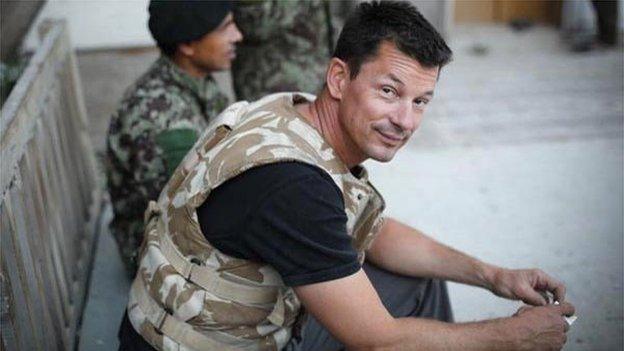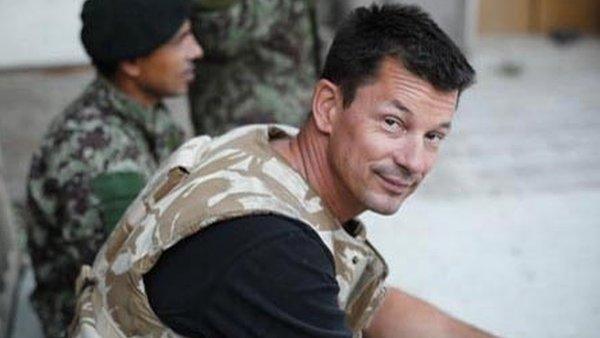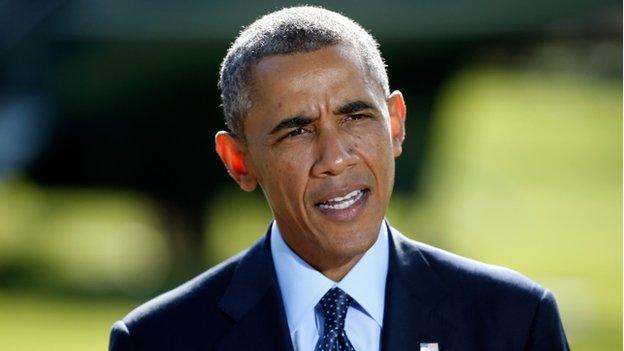Analysis: What was the aim of IS's John Cantlie video?
- Published

John Cantlie was kidnapped in Syria in 2012
The release of a second Islamic State video featuring captured British journalist John Cantlie is the latest propaganda instalment from the group, write Shiraz Maher and Peter Neumann of the International Centre for the Study of Radicalisation.
Hostage Mr Cantlie touches on a broad range of topics, casting Islamic State as an invincible fighting force ready to confront a brittle Western alliance. He also makes overt reference to the West's controversial campaigns in Vietnam, Afghanistan, and Iraq.
Gruesome beheading videos of Western hostages released by Islamic State are by now, unfortunately, to be expected. However, the videos featuring Mr Cantlie mark a dramatic shift in the group's propaganda strategy.
Whereas the group's beheading videos have featured a knife-wielding, masked jihadist, these latest videos are much more sterile. Mr Cantlie is supposed to provide a seemingly neutral assessment of the confrontation ahead. This is Islamic State's "good cop, bad cop" approach.
While the beheading videos were clearly designed to scare and shock, these videos have a different message. Their aim is to portray a more reasoned and rational approach.
'Strong and united'
Few would sympathise with Islamic State's policy of beheading journalists and aid workers. This has made it easy for Western governments to make a strong argument in favour of confronting the group militarily, taking on what appears to be a barbaric and medieval adversary.
By contrast, the videos featuring John Cantlie are designed to make a more reasoned case. For example, Mr Cantlie refers to hostages from other countries who were released after their governments negotiated with Islamic State.
This is part of a broader strategy where Islamic State wants to assert its strength and legitimacy. In a nutshell, it wants to be recognised as a state.
It also wants to project an image of itself as strong and united - while portraying the West as weak and divided. These are the supposed lessons of Afghanistan and Iraq where despite its military might, the West failed to comprehensively defeat its jihadist enemies.
The intention is to reach war-weary Western audiences who are sceptical of intervention in what they see as yet another Arabian quagmire. So far, this constituency has been largely silent because of Islamic State's clear brutality. Mr Cantlie's videos are aimed squarely at them.
Attempts are belated
He criticises Western strategy regarding the Islamic State, predicting that within six months President Obama's promise of keeping boots off the ground will be broken. The unspoken corollary is clear; another long and arduous commitment lies ahead.
There is a way out, however, according to Mr Cantlie - the group can be reasoned with if its opponents negotiate in good faith. This offer will appeal to those who believe that jihadist groups such as Islamic State can be reasoned with.
In reality, of course, the West's current strategy is what Islamic State fears the most. Either it wants the West to disengage entirely - allowing them to overrun their enemies in the region - or launch another Iraq-style invasion, drawing the West into an excessive commitment that can be portrayed as a belligerent assault on Islam itself.
These attempts by Islamic State to portray itself as a reasoned and legitimate actor are belated. Few believe that Mr Cantlie is speaking his own mind in these videos and the purpose of the videos as propaganda is clear.
Shiraz Maher (@ShirazMaher, external) is senior fellow at the International Centre for the Study of Radicalisation (ICSR), King's College London. Peter Neumann (@PeterRNeumann, external) is director of ICSR.
- Published23 September 2014

- Published23 September 2014
